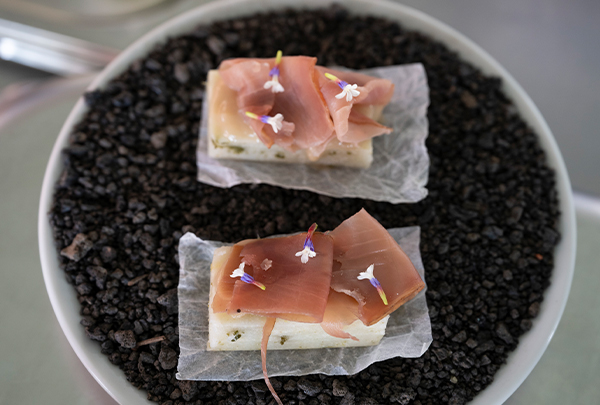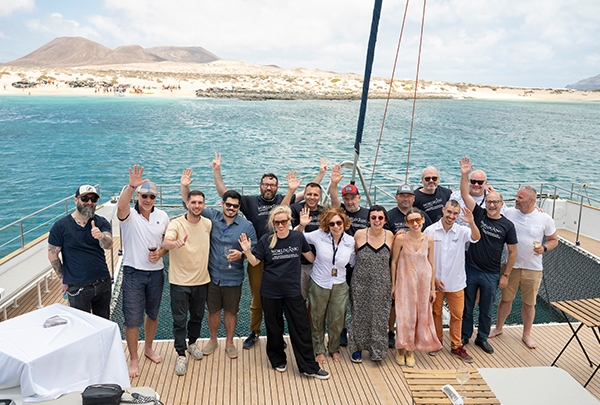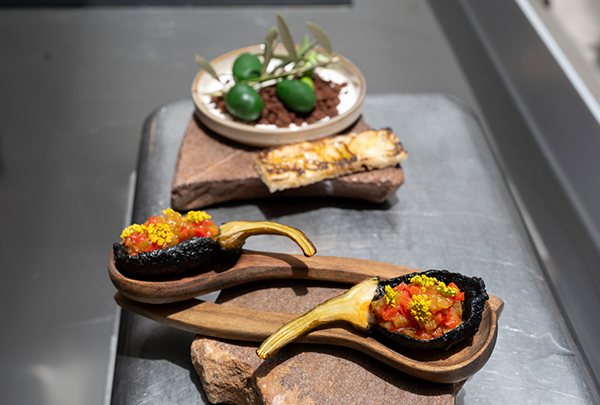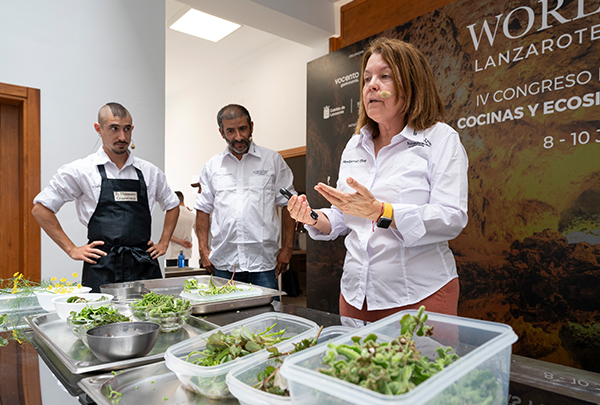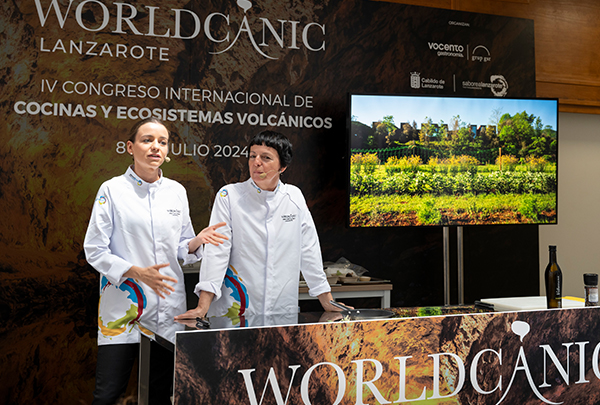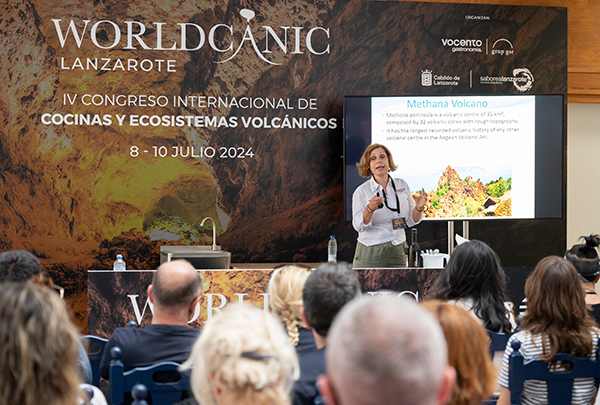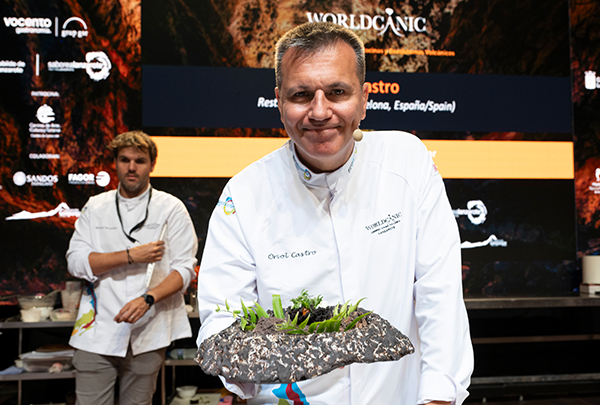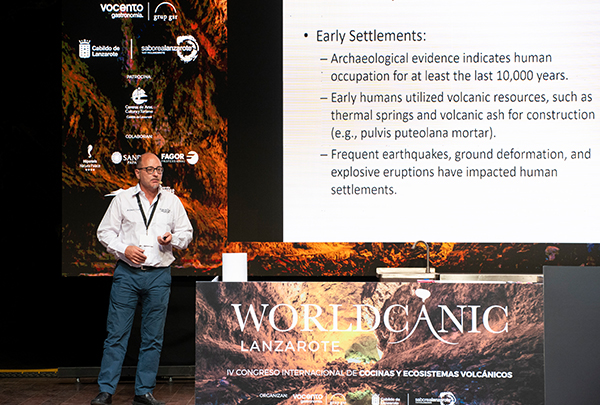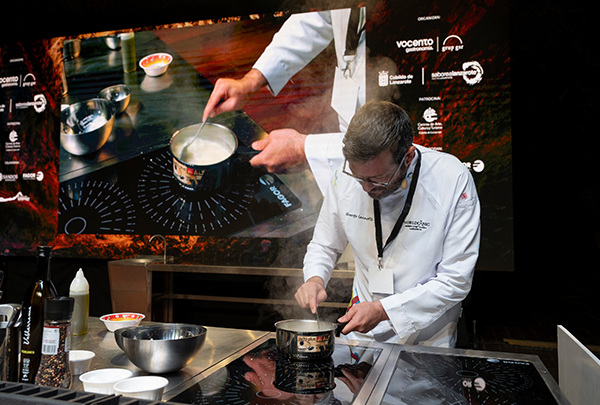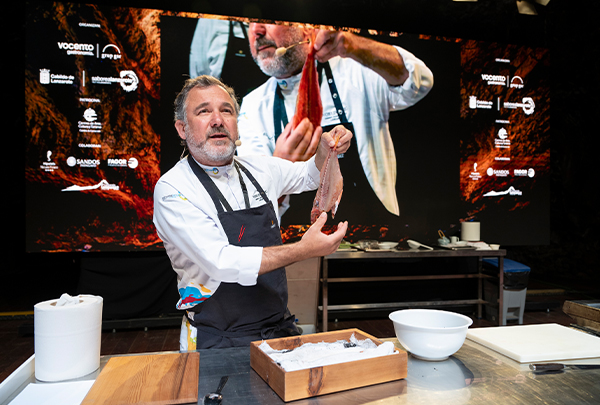News
Worldcanic discovers the volcanic roots of the world's best restaurant
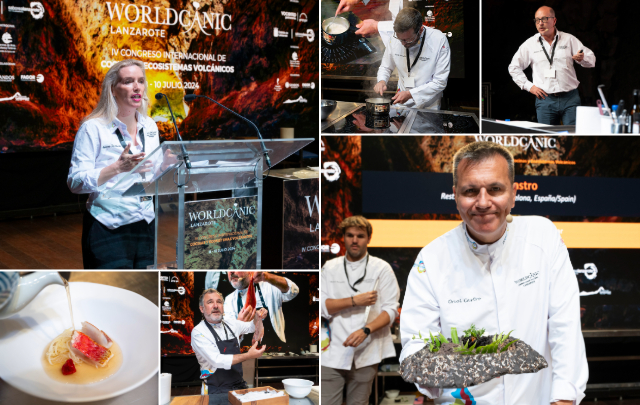
The first day of the fourth edition of Worldcanic will highlight the uniqueness of each volcanic territory and invite chefs from other regions to embrace their products and natural resources in order to discover their richness.
The Jameos del Agua hosted the first day of the fourth edition of Wordlcanic, an interdisciplinary congress that has shown that it not only unites the inhabitants of volcanic environments but is also capable of welcoming those willing to embrace the benefits of volcanic ecosystems. Such is the case of Oriol Castro, chef of the three-star Disfrutar (Barcelona) and recently named Best Restaurant in the World by The50Best list, who confessed that "tradition in a cuisine is as important as creativity and innovation, and that is why I greatly value the cuisine of essence and territory, such as that offered by volcanic environments".
These words were in line with the speech by Oswaldo Betancort, president of the Cabildo of Lanzarote and in charge of inaugurating this new edition of Worldcanic, who stated that Worldcanic is a congress that has become "a movement that integrates multiple dimensions with the aim of protecting volcanic communities". A task that involves protecting "the uniqueness and richness of volcanic cuisines and ecosystems" and in which the island of Lanzarote is strongly involved. His words were corroborated by Benjamín Lana, general director of Vocento Gastronomía, who added that the basis of all this is the sharing of knowledge between professionals from different disciplines, since "culture arises from human contact, and from human culture, richness".
The chef of Disfrutar, Oriol Castro, joined in this richness. Although his is not strictly speaking a volcanic cuisine, he wanted to make an exercise in reflection to present in Woldcanic "some useful messages, which are often more valuable than the ideas in preparation", reinterpreting some of the dishes that have made his restaurant famous in a local key. Castro has gastronomically shelled out the elements of the volcano and, for example, he has been inspired by the ashes to make the confit tubers that he achieves by nixtamalising them with water and lime. On the other hand, to talk about temperature, he has shown the black cauliflower that he achieves after long hours of heat in the Korean pot, or his black apple roasted at 600 in a hot cupboard imitating the temperature of the volcanic soil until it has the appearance of a prune. And inspired by the rofe, that characteristic volcanic rock that dominates Lanzarote, the Catalan has shown the sophisticated elaboration of the famous charcoal of kings dessert with roasted mango heart and liquid pine nuts, from which an edible foam sprouts achieved with apple water.
Another chef forged in the kitchens of elBulli, Albert Raurich, was also present in Lanzarote to talk about Japan, another great volcanic territory that he and his team recreate in their Japanese cuisine restaurant in Barcelona, Dos palillos*. Raurich explained that it is important to know and understand the culinary tradition in order to continue growing. In this sense, he advanced that "in collaboration with the elBulli Foundation we are organising and cataloguing 'the sapiens of Japan', a work that will take us 3 or 4 years and that will end up in a book or on a digital platform". The aim is for everyone to understand a cuisine that for the chef is "almost perfect, because of its philosophy, its search for beauty and spirituality, and because its complication lies in its simplicity".
Returning to Europe, chef Giuseppe Iannotti, who runs the two-starred Krèsios in Naples, took the baton in Lanzarote and has defended one of the most important ingredients of his native volcanic cuisine, which is, after the piennolo tomato from Vesuvius, the buffalo mozzarella from Campania. According to the chef, Campania buffalo mozzarella is unique, because it depends on the buffalo's diet, "and its taste is even divided into two types, the one that comes from the area closest to the volcano, which is softer and sweeter, and the one from the area a little further away, which is more flavoursome and with a chewy texture", he described. He added that "I am a very bad ambassador for this product, as I believe it should not be exported; it should be eaten at source and no more than two hours after extraction, as after that time it loses part of its texture and properties".
Every volcano is a world
The chefs who have shared their knowledge and experiences in Jameos del Agua have exemplified how each volcanic territory lends uniqueness to its cuisine. A reality that the French geologist and volcanologist Anne Fournier explained scientifically, as "each volcano is unique and has its own ecosystem". The magma is different from one volcano to another and this creates its own fertile soil and 80% of the species in each volcanic system are endemic. A particularity that explains "why each product harvested in these volcanic soils is different from place to place and can provide chefs with the unique characteristics of each territory", the founder of the Volcano Active Foundation explained.
Her Italian colleague, Dr. Antonio Costa, emphasised the deep connection between human activities and the volcanic area of Campi Flegrei over the last 10,000 years of history. The Campi Flegrei region, located in Campania (Italy), is one of the most significant volcanic areas in Europe, known for having produced the largest eruption on the continent at least 200,000 years ago and "its geological activity has shaped both the landscape and human settlements and activities", explained Costa. With his talk, the Italian researcher delved into how humans have historically exploited the natural resources provided by the volcanic environment, "such as volcanic ash for building materials and thermal springs", while at the same time detailing "the challenges of living in such a dynamic area, including earthquakes, ground deformation and periodic eruptions".
Wordlcanic concluded its first day with a round table discussion in which it became clear that this connection and exploitation of volcanic resources continues today in various sectors. This is the case of tourism and gastronomy and their closest relationship: that of gastronomy in hotels. Koldo Eguren, head of Kamezí Boutique Villas; Fernando Turnes Pérez, director of the Hotel Royal Hideaway Corales Resort 5* and Javier Suárez, tourism consultant and Grupo Fariones, all of whom are present on the island and who were moderated by the president of Eurofintech/Alianza Hotelera, Fernando Gallardo, debated on this and its growing importance.
This first day also recognised the work of master sommelier John Szabo, one of the experts who knows volcanic wines best, a position he confirms every year at the Volcanic Wines International conference in New York, which he co-founded and which is dedicated to discovering the best wines grown in volcanic soils around the world. The Canadian was grateful for the award and was particularly moved by the fact "to receive it in Lanzarote, the island to which I made my first trip ten years ago when I started working with volcanic wines".

